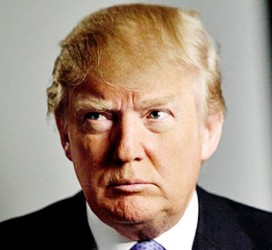What’s most worrisome about Republican presidential hopeful Donald Trump’s xenophobic remarks about Mexicans is not that he actually made them, but the fact that they seem to have helped him among Repub-lican voters nationwide.
 What’s more, the business tycoon’s tirade against Mexico and Mexicans was celebrated by some of his fellow Republican hopefuls, and have yet to be officially denounced as offensive — if not outright racist — by the Republican National Committee.
What’s more, the business tycoon’s tirade against Mexico and Mexicans was celebrated by some of his fellow Republican hopefuls, and have yet to be officially denounced as offensive — if not outright racist — by the Republican National Committee.
Obviously, part of the US population is still willing to believe the blatant falsehoods and half-truths uttered by Trump and other politicians who, like populist demagogues in other countries, seek popularity by blaming foreigners for their countries’ economic problems.
According to a Pew Research Center poll, only 39 per cent of Americans expressed a favourable view of Mexico in 2013, down from 47 per cent before the US financial crisis of 2008. The US economic downturn may have had a lot to do with this downward trend.

In a June 16 speech announcing his candidacy to the Republican nomination, Trump lashed out against Mexico for allegedly flooding the United States with undesirable immigrants.
He said Mexico is sending to the United States “people that have lots of problems, and they are bringing those problems to us. They are bringing drugs, and bringing crime, and they’re rapists.” He also said he would force Mexico to pay for a wall across the border. Following his remarks, Univision, NBC and Mexico’s Televisa networks severed their ties with Trump-related Miss USA pageants and other TV shows.
Problem is, Trump’s entire tirade is based on the false premises.
First, portraying Mexican immigrants as criminals is an insult to 34 million American residents of Mexican origin, the overwhelming majority of whom are honest and hard-working people.
Second, implying that Mexican immigrants are flooding the United States is plainly wrong. In fact, the flow of Mexican immigrants to the United States has plummeted over the past four decades, falling from about 400,000 per year a decade ago to 125,000 nowadays, according to recent figures from the US Census Bureau’s American Community Survey.
Immigration from Mexico has fallen because of the 2008 US financial crisis, lower birth rates in Mexico — where the fertility rate has fallen from about 5.5 children per woman in the 1970s to 2.5 children today — and increased border security measures.
Third, the claim that a wall alongside the entire US-Mexico border would stem the flow of Mexicans is at best doubtful: Nearly half of Mexican undocumented immigrants are not crossing the border, but arrive by plane and overstay their visas. A wall would be a huge waste of money, regardless of who pays for it.
Yet, after his misleading statements, Trump rose to No 2 — behind Bush — among more than a dozen candidates in a new CNN poll nationwide. He was already No 2 in a previous CNN/WMUR poll in New Hampshire, the first state to hold the upcoming primary elections in February.
Andrew Smith, a University of New Hampshire professor who conducted the New Hampshire poll, told me that immigration is not a big issue in that state, where only 3.2 per cent of the population is Hispanic.
“By taking an outsider stance, he attracted attention and press,” Smith said. “It made him look like he’s somebody who is not afraid to say things that are in the minds of voters, but that many are hesitant to say.”
What was the reaction of Trump’s fellow Republican hopefuls? Sen Ted Cruz, R-Texas, openly supported Trump’s remarks, saying that “I think he speaks the truth.” Most others remained neutral.
Only Jeb Bush, who is married to a Mexican woman, reportedly said at a Saturday event in Nevada that he didn’t agree with Trump’s words, and that they did not represent his values, a Bush campaign aide was quoted as saying by The Washington Examiner.
Republican National Committee Chairman Reince Priebus told a news conference on June 26, 10 days after Trump made his remarks, that the aspiring candidate’s statements were “not helpful.” Hardly a stinging condemnation of what many see as offensive remarks against millions of law-abiding Mexican immigrants.
My opinion: Trump may be a clown, or an unscrupulous politician seeking headlines, but there is no excuse for most of his fellow Republican hopefuls’ silence and, more importantly, for the Republican National Committee not coming out with a formal and unequivocal statement condemning Trump’s insults against the largest US minority group. That’s what’s really troubling about this entire charade!
© The Miami Herald, 2015. Distributed by Tribune Media Services.





